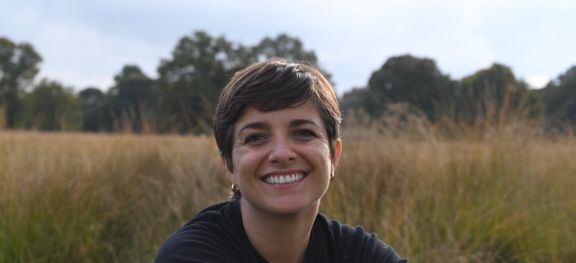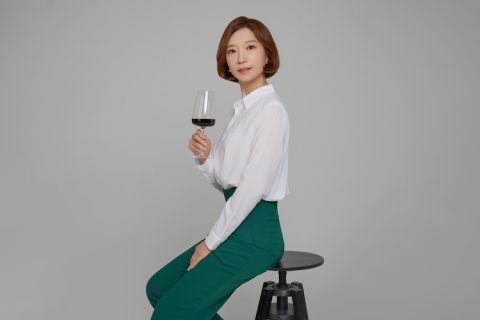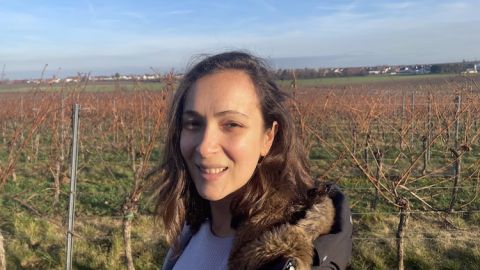Some 2023 Golden Vines applicants – part 1


The first of three collections of profiles of some of this year's applicants for the three Taylor's Port Golden Vines Diversity Scholarships, winners to be announced in September. They have been written by Romané Basset of the foundation named after his father Gérard. See also part 2 and part 3.
Argentinian Florencia Gomez, pictured above, had to battle what she calls ‘a strong macho culture’ when studying winemaking at the University of Mendoza. This is perhaps best exemplified by the fact that, though 60% of winemaking graduates from the university are female, women account for only 13% of Argentine winemakers. She did manage to get a job making wine but after six years her curiosity led her to try her hand at the export side of the industry, before moving into freelance wine marketing.
Frustrated by the narrow range of wines available to taste in Argentina, she moved to London to gain greater access to the wines of the world … precisely one week before the UK's COVID-19 lockdown began. Undeterred, and like so many, she moved her business online to deal with to the new reality, learning much about digital marketing along the way. Determined to improve the representation of Latin American women in the world of wine, and inspired by figures such as Marina Gayan MW (currently Latin America’s only MW) and Caro Maurer MW, Gomez has joined the MW programme. She feels that not only will it enable her to further her passion for wine, but that it should make her a more prominent role model for women from under-represented communities.
She already practises what she preaches. Not only does she make an effort to hire Latin American women and women from under-represented minorities in her consultancy work, but she also works in supporting and mentorship roles with groups such as Bâtonnage and Queena Wong’s Curious Vines, each dedicated to improving female representation in the wine industry in the US and UK respectively.
Ahyoung Jeong, pictured above, is a Korean wine entrepreneur and educator living and working in Seoul. In Korea, there are currently no MWs, and only a handful of DipWSET holders, so Jeong is distinctly short of the role models who can be so helpful in other parts of the world. A further difficulty is the distance between Korea and most of the world’s leading wine markets and wine regions. Undeterred, she has been a diligent student, always striving to excel. She gained a Distinction in the WSET Level 3, a Merit in her DipWSET, and was ranked first at the inaugural Vintage Port Academy held in Seoul in 2018 thanks to her essay on how to market vintage port.
Having always wanted to undertake the MW, Jeong was accepted in 2020 onto the Vinifera Euromaster MSc in Viticulture programme, which she saw as the ideal next step on her journey towards the MW qualification, but the project was abruptly curtailed by the onset of COVID-19. Her plans upset, Jeong decided to ‘make lemonade out of this sour lemon’ and allowed her entrepreneurial spirit free rein. She started writing her first wine book, Do You Like Wine?, aimed at beginners; founded her own wine academy (registered as a WSET Approved Programme Provider, one of very few in Korea), which focused on providing a comfortable atmosphere and small classes; and then went on to produce wine content on YouTube through her channel Jayne’s Wine House.
Jeong plans to share her MW journey through the old and new media networks which she has created and grown in order to demonstrate that, even for those who do not live in major wine markets and who do not speak English as their first language, the Master of Wine, and indeed a career in the wine industry, is still an attainable and fulfilling objective.
Gabriela di Nardo, pictured above, is a Venezuelan wine educator and community manager who currently lives and works in Barcelona, Spain. Gabriela grew up immersed not in wine but in the ‘exotic spices and fruits’ of Venezuelan cuisine which, she says, ‘laid the groundwork from which [she] could develop [her] tasting skills’. She studied tourism but spent her teenage years in a mixture of fear, insecurity and uncertainty because of the political situation in Venezuela. Di Nardo moved to Houston, Texas, to pursue first studies and then a career in restaurant and catering management.
When her work visa expired, she returned to Caracas but had fond memories of being in charge of ordering wines while working as a restaurant manager in Houston. This sparked her interest in wine and led her to move to Barcelona in 2014 to join the sommelier programme at the university there. She had a lot to learn and freely confesses that when she arrived in Spain she thought ‘Chardonnay was a synonym for white wine and Montsant was a wine made with genetically modified grapes’. Di Nardo had little idea that this move would be the beginning of a long and fulfilling journey in the wine industry.
Since then, she has gone on to work for Freixenet, Klaus Peter Keller (who was very impressed by her) and the Barcelona wine store Vila Viniteca. Today she is a Barcelona-based freelance wine educator and consultant. Her varied and wide experience has exposed her to what she calls ‘the challenges of being a Latin American woman working in wine’, encountering people who doubt that a Venezuelan woman could know much about wine. She says she is determined to disprove these naysayers and serve as an example to other Latin American women by becoming the first ever Venezuelan Master of Wine.
Become a member to view this article and thousands more!
- 15,399 featured articles
- 274,790 wine reviews
- Maps from The World Atlas of Wine, 8th edition (RRP £50)
- The Oxford Companion to Wine, 5th edition (RRP £50)
- Members’ forum
- 15,399 featured articles
- 274,790 wine reviews
- Maps from The World Atlas of Wine, 8th edition (RRP £50)
- The Oxford Companion to Wine, 5th edition (RRP £50)
- Members’ forum
- Commercial use of our Tasting Notes

